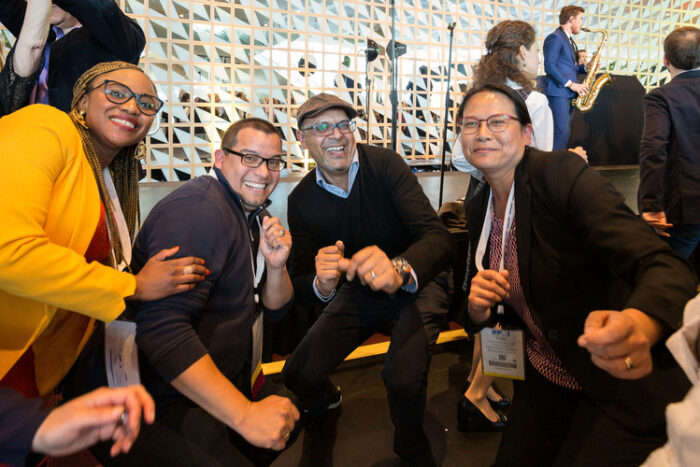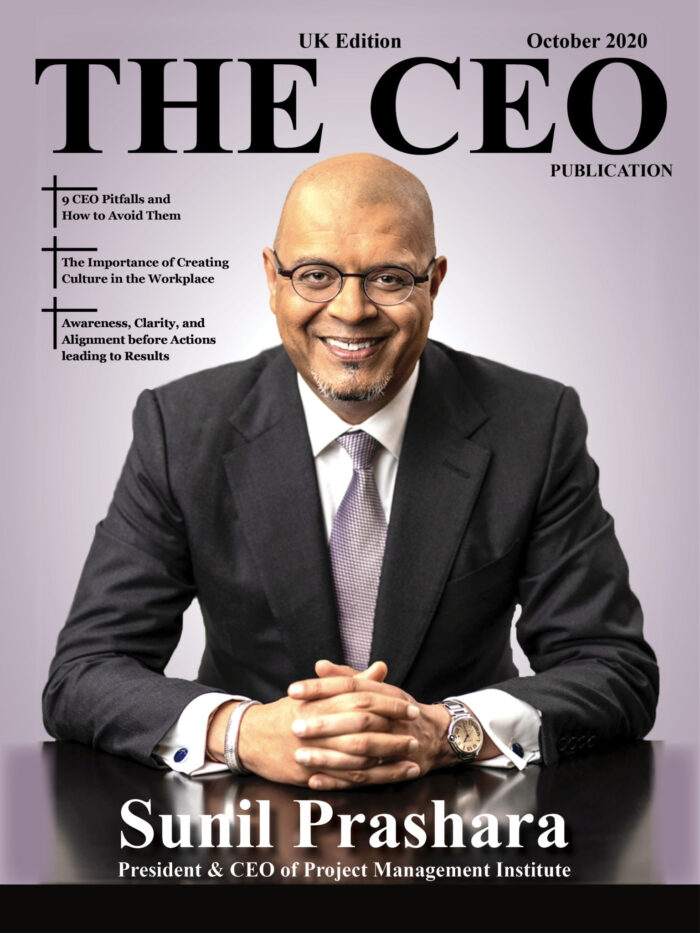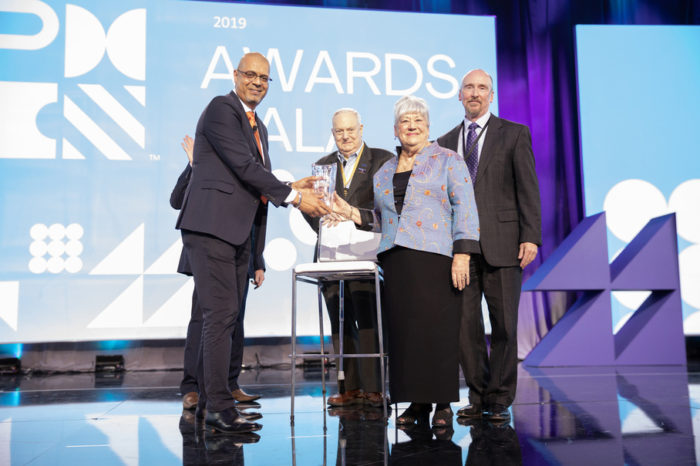A conversation with Sunil Prashara by Agnieszka Krogulec
What made you decide to join PMI as its CEO?
I have worked in many different functions over the years. I was really attracted to PMI, because I love its purpose. I liked the fact that it is not for profit – the type of organization I haven’t worked before, but I possessed a global experience I could bring to the table. PMI in fact is a global organization which is very attractive. The organization was also gearing myself up for a major transformation. I’d spent a lot of my career doing transformations like digital transformations or organizational transformation restructuring. I’ve always been involved in change situations, so it was another opportunity for me to make a difference. When I was approached by the PMI board, I was asked to recommend people who I knew who might be interested in this role. I gave a couple of recommendations, but PMI asked if I personally was interested in this position. I was quite busy with my own business, which had just started, so I said “No”. What happened later – my wife looked at the job spec. She said: “Sunil, this role is 100% you!” If my wife said so, it must be something. Then I looked at the job spec and said: “Yes, it’s exactly me”. It’s like they’ve described me emotionally, from where I was in my career at that time, the skill set they’re looking for… it all matches what they’re trying to do as an organization.
Could you highlight any key steps in your career helping you to be in your present position?
This is my 3rd CEO position. I have started my career as an accountant and worked for 10 years as a finance guy. Then I made a change. It wasn’t my idea to do so, but my bosses thought I should try and move into a sales department. That’s very different from finance. In sales you are playing th game, you have to shoot the gold. So I did that and I did it very well. My career in sales lasted for about 10 years. Then I wondered what it must be like to work in a delivery organization. I changed again and moved into an operational mode – that’s where I came across project management. That has also grounded me out and put myself on the road to general leadership and general management. I became the CEO, then started my own company and then joined PMI. The steps were building my confidence in my own evidence of understanding the businesses from the grassroots of finance to the top end of sales, and whatever comes in the middle. The combination of all of those gave me the confidence to step up.
 Sunil Prashara, PMI’s CEO
Sunil Prashara, PMI’s CEO
Source: PMIDo you have any daily routines? What drives you and gives you energy after you wake up in the morning?
I’m quite energetic. I don’t have any routine, besides running, which I do every morning. It’s my way to meditate. I don’t listen to any music or anything else. I just run and think about what happened the day before and about the major issues that are on my mind. I find that time very useful to just sort of my thoughts and to get myself ready for the day. And it keeps me fit as well. I think experience matters – learning from mistakes. Making the space for some time in the mornings and reflecting on e-mails which I could have worded better or misinterpreted. Some personal time to reflect makes a huge difference in leadership. I have reflected on the power of listening skills. I tend to get very energetic when I am passionate about something and I can talk long hours about it, but the others also want to say something important. So I’ve had to learn to be quiet and let somebody else speak. The author and professor Adam Grant talks about givers and takers. I think that prominent leaders, remembered by people for good things, are typically givers. There are also leaders that are takers as well, but generally speaking, I think if you have a sense of purpose, you’re empathetic towards your colleagues, you understand that where they’re coming from, and you’ve got a giving nature – I think people will tend to follow you.
Do you have any leader you follow or a person you admire?
There are so many. Ross Perot was one guy who from a business perspective was a very intriguing leader that I felt compelled to follow. I also really like the previous CEO of Nokia who was also a human through and made a major transformation of the company. A very smart and a strong leader on the social side. Malala Yousafzai is another interesting leader, showing in her books that she is a leader in advocating for human rights. I think there are insights and perspectives you can get from multiple people who speak out and challenge the norms. For example, Dr Anthony Fauci – on COVID in the USA – stuck to what he had been trained, despite the fact that politically he was under tremendous pressure. I think that’s really strong leadership too. There are many people that I think individuals can look to.
 Sunil celebrates PMI 50th anniversary with volunteers in Dublin
Sunil celebrates PMI 50th anniversary with volunteers in Dublin
Source: PMIYou joined PMI two years ago and I have an impression you completely changed the way it works – not only the logo has been changed, but the way PMI operates globally. I remember you standing on the stage at the conference, with your PMI hoodie and a pair of Converse sneakers. I told myself – wow! Something bigger is coming! How have you been managing the transformation in PMI?
The board wanted to make a lot of the changes and many of the projects were in planning already. It needed somebody who could execute it. A part of that is a change in culture and a change in ‘personality’ of PMI. What helped was the fact that I’m not a project manager, but I understand other constraints correctly. Also, I’m really informal. I told the board that I’m going to break the existing formality, because with that you get stiff. We needed to become nimble, we needed to become flexible and show the world that we’re not a structure. We’re not a system. We’re humans. The board gave me the opportunity to make sweeping changes – there’s still a lot of work to do. From the beginning, I wanted to reach out to the chapters. There was a lot more in plan, but COVID came. The pandemic hit extra changes that we have to make because of that. Communicating more, reaching out – it’s going to become super important.
What was the biggest challenge for PMI in the pandemic from your perspective?
We spent five months putting together a budget and a plan. In February, COVID hit – five months worth of work and plans we wanted to do in 2020. We had to go remote. We had to stop traveling and we didn’t know how bad the situation was going to be. Immediately we set up a risk team. The biggest challenge I found was with the following 3 aspects. The first one – if all our staff is safe all around the world – that was and is still today the priority. Number two – if we have sustained ourselves? If this thing continues for a long period of time, how long can we sustain ourselves as an association? If the association collapses, then everything around the ecosystem collapses as well. Our people first. Our association second. And then the third one – the ecosystem – how can we support that ecosystem if we can’t support our people? If the association collapses, then everything around the ecosystem collapses as well. We had to move very fast on our transformation. My biggest concern was if we would be able to find a way of organizing everything in a structure for the new reality – how we are going to organize a meeting regarding the planned changes. And we did it. It’s amazing what we managed to do and we had a fantastic 2020, even as it was a tough year personally for a lot of people. Despite the challenges, we’ve managed to keep our people safe. Despite the challenges, we managed to accelerate our transformation. Despite that we restarted to stand up again and moved on to online proctored testing. We bought virtual events and because of the amount of communication that we have with people by topic, we started to give back a lot of free courses, a lot of PDUs, a lot of stuff. Slowly we came out of it stronger. The most amazing thing we have now is that we have one amazing team that has gone through real tribulations and serious anxiety. I’m super proud of the entire community and there’s still a lot of balls in the air.
 Sunil featured on the cover of The CEO Magazine
Sunil featured on the cover of The CEO MagazineWe have grown as an organization significantly. PMI is building on its PMI 2.0 Strategy to achieve what you call PMI 4.0. What’s driving this change and the need to implement at this time?
PMI 2.0 was an investment in our infrastructure. The administrative processes and procedures within the PMI organization were in heavy need of modernization – many years we had not embraced digital. Technology is moving extremely fast. We have to make that investment and bring the infrastructure to allow us to scale. Now we got all the infrastructure, we’ve got the capabilities. Our focus now is to scale and grow. We have set out to show organizations around the world that if you want to get work done, we’re the people that are best trained to help you get work done and to take on challenges. That’s what we want to achieve. We used to say that project management and the work that we teach is relevant. I’m actually advocating that it’s essential for organizations and for the people to get work done. We have to enhance those skill sets and develop them further, because technology is playing a big part with a lot of shifts. We also have to think differently. 4.0 is all about how do we scale and how do we become a bigger voice? How do we bring more people into our community? How do we attract the youths? How do we attract older people who are going to be living longer and contributing in the organization? How do we become the complete go-to-place for all projects all the time. We’re not at the end of the change – there’s still a lot of work to do and in the middle of the process we have been hit by the pandemic. I just happened to be the chap at the front, who wanted to bring a different field to PMI – a more personable field. I want to reach out to the chapters. There is lots more coming. We want to communicate more, reach out more – this is super important and will be important moving forward.
PMI has always operated in a traditional model of Global and Chapters. When I was the President of the PMI Poland Chapter I remember a lot of voices from Europe that the main focus of the organization was on the USA. In the last 2 years, as part of the transformation journey, PMI has experimented with a regional focus. Why did we shift? What is the impact on Chapters?
One of the changes that we faced was to build out a regional model. PMI for the last 50 years has really been massive. It’s a global organization, but actually Newtown Square was the headquarters and the focus. The things happening in Singapore are very different to what’s happening in Philadelphia, in India or China, etc. The chapters were evolving, the volunteers were evolving and the ecosystems were exploring being relative to their own regions with their own regional focus areas, which is different to what may be the point of view in North America. It is becoming harder to be managed from one central area and as we scale. And that’s what triggered me to say, we need to have a regional representation beyond what we already have. What we did is put in place Regional Managing Directors for each region. I’m very pleased with how that’s going. Europe is super important to us. There are a lot of government activities in the UN and the EU that we should really be coaching and guiding and working with. One of the other points to mention is that we have a tremendous number of membership and chapters in North America and also we have tremendous activities in China. Those are the two big hubs that we have; however, the rest of the world presents massive opportunities as well – Africa, Latin America, Europe. In order to keep ourselves sustainable and to prepare for another shock like COVID, we need to build all these other regions as well. My role as the CEO is to ensure that we build out these other regions are strong and prepared for the future.
 Sunil takes part in a roundtable discussion on the rise of Artificial Intelligence at the European Business Summit in Brussels
Sunil takes part in a roundtable discussion on the rise of Artificial Intelligence at the European Business Summit in Brussels
Source: PMIPMI focuses on youths – I am also proud that Agnieszka Gasperini is the first woman from Central Europe, from Poland, a member of the Board of Directors. Is it a new trend that more younger people will have an influence on the strategic development of PMI?
If you look at the average age of membership and volunteers in PMI over the last five years, the average age has been increasing. I think it is around 48 now and it’s increasing, which means we’re not getting youngsters that are coming in. We need those people that are young today. We want them to have a journey with us. That means that we will want to nurture them when they’re young. We want to coach them and then we want to upskill them. It all starts with the youth, and that’s why we kicked off a programming 4.0 around youths to specify how we bring them to the organization. It tries to answer questions: how can we relate to the youths? How can we create propositions that they can see?: ‘Hey this is going to be really relevant for your future!’ Because a lot of youths don’t think too deeply about their future, they would rather play video games. But if we can find a way of how we can go to these folks and do it in a fun way that resonates with them, then there’s more likely that they’re going to come on this journey with. That’s why there’s been this big drive. PMI – Project Management Ready is one example of a new offering that is designed to introduce youth to different ways of working. No matter what, I think youth is critical for us in the future.
How do you feel PMI would be in the next 50 years?
I genuinely think that we have the opportunity to go to the place for all forms of work. I think we have the platform to be the organization that shares best practices for all different forms of work and shows how to get work done for the future. We, as PMI, have to evolve. If we just stay stuck in one way of working or don’t continue to move with this changing world, we will become irrelevant. Right now we’re super relevant, and we’re becoming essential – that’s because we are moving fast. We’re building on our heritage of waterfall; that will never go away and it will always be relevant. But we’re building it with our Agile practices, and we build on that with our Citizen Development practices, we build on that with design thinking, and then we broaden into leadership and organizational transformation. I can’t tell you what it will be like in 50 years time, but I can tell you that in the next 5 years – it will be 10 times bigger than we are now, and X times bigger in the future, because we already have a much bigger community of changemakers.
 Sunil with PMI Award Winners at PMI’s 50th Anniversary Celebration in Philadelphia, Pennsylvania
Sunil with PMI Award Winners at PMI’s 50th Anniversary Celebration in Philadelphia, Pennsylvania
Source: PMIWhat about the future of project managers as professionals? Do you think anything will change and if so – how to prepare for that?
When you look at most organizations coming out of COVID, they have new ideas and plans that they have to change. They have to look at the data completely thrown up on their whiteboard, because their organization is now totally different to what it was before COVID. They have a gap, and the gap is where they are now – what systems have changed and what ecosystems have changed, and where they need to be. Someone has to execute this gap and deliver onthat. They have to convert that whiteboard into reality. That role will never go away. People who are trained to get stuff done will never go away. There will always be a need for a person that collaborates and brings all together the pieces to create a team effort for a company to get the project completed. Organizations want to be able to deploy people on project by project, but they don’t want to keep going outside from the market and find another person to execute on this project. I just think it’s just an evolution of existing. People evolve, people change and learn and they move. You don’t learn – you don’t change.
Do you recommend any book that has inspired you recently?
One of the books I really like is called The Phoenix and the Unicorn, written by Peter Hinssen. The Unicorn is a startup company that’s worth a billion dollars that’s going well; the Phoenix is a bird that rises from the ashes. The act of the ashes are like COVID, and effects of the world. What is the bird that rises and then what does it look like in a gymnastic organization? I love Peter Hinseen’s work on that. I also like Costas Markides. He’s just written a book Organizing for the New Normal. That’s about how companies organize themselves in this new book of the world that we’re in. Finally, there’s a great book by Lynda Gratton and Andrew Scott, that’s called The 100-Year Life. It talks about the fact that people live a lot longer. Current medicine opens up a whole new mode of new opportunities for the older generation to continue with their careers or perhaps even start a new career. If they’re going to live another 20 years and be active, why retire at the age of 65? Why not start a new career? The book reminds me that we are living in a time of great possibility.
The interview has been conducted by Agnieszka Krogulec in collaboration with Kornelia Trzęsowska.
President & CEO of PMI and a globally recognized leader on new ways of working and the growing shift toward project-based work known as The Project Economy. The CEO Publication has recognized him as one of the Top 20 Dynamic CEOs of 2020 in the U.K. Under his leadership, PMI has also received a range of industry awards. Sunil also serves as a member of the advisory board of the Global Peter Drucker Forum. Sunil led PMI’s transformation into a global and innovative enterprise, serving an expanded portfolio of products and offerings to project professionals and changemakers around the globe. Before joining PMI, he held numerous executive leadership positions throughout the information and communications technology and telecommunications industries. He speaks Punjabi and Hindi. He resides in the U.K. with his wife and two sons. He enjoys golf, boxing, martial arts and traveling.

[ENG] Project Manager based in Wrocław and fascinated by the IT industry and Agile management approach. She considers effective communication and openness to others to be her greatest strengths. Creativity is her second name and if not management – she would probably become a journalist. She is fluent in German, loves this language and culture, and therefore enjoys most working with clients from German speaking countries. After work, she recharges her inner batteries thanks to creative activities such as writing, painting or photography and reading about psychology. She has been active as a volunteer for several NGOs for a long time.
[PL] IT project managerka zafascynowana światem nowych technologii. Za najważniejszą w projektach uważa komunikację oraz budowanie stabilnego mostu pomiędzy światem zespołu ze światem klienta. Z wykształcenia filolożka, biegle posługująca się językiem niemieckim. Pasjonuje ją psychologia, joga, muzyka i wszystko, co kreatywne. Kocha rozmawiać z ludźmi, stąd została redaktorką Strefy Wywiadu. Wspiera wrocławski oddział PMI w budowaniu relacji z biznesem. Leaderka VI edycji Programu Mentoringowego PMI PC.
Ekspertka i pasjonatka zarządzania projektami oraz ludźmi. Doświadczony facylitator, trener biznesu, mentor, coach. Posiada 20 lat profesjonalnego doświadczenia w realizacji projektów dla biznesu i IT, w tym w firmie konsultingowej Deloitte oraz w zarządzaniu PMO. Obecnie Manager w Group PMO w DSV. Prezes Zarządu PMI Poland Chapter (2016-2018), wieloletni Członek Zarządu PMI PC i European Chapter Cooperation Liaison. Asesor i członek jury konkursów oceniających najlepsze projekty oraz PMO w Polsce i na świecie (USA, Chiny, RPA). Absolwentka PMI Leadership Institute Master Class. Entuzjastka społecznego przywództwa, zaangażowana w projekty tworzące nową jakość i zmieniające świat na lepszy.